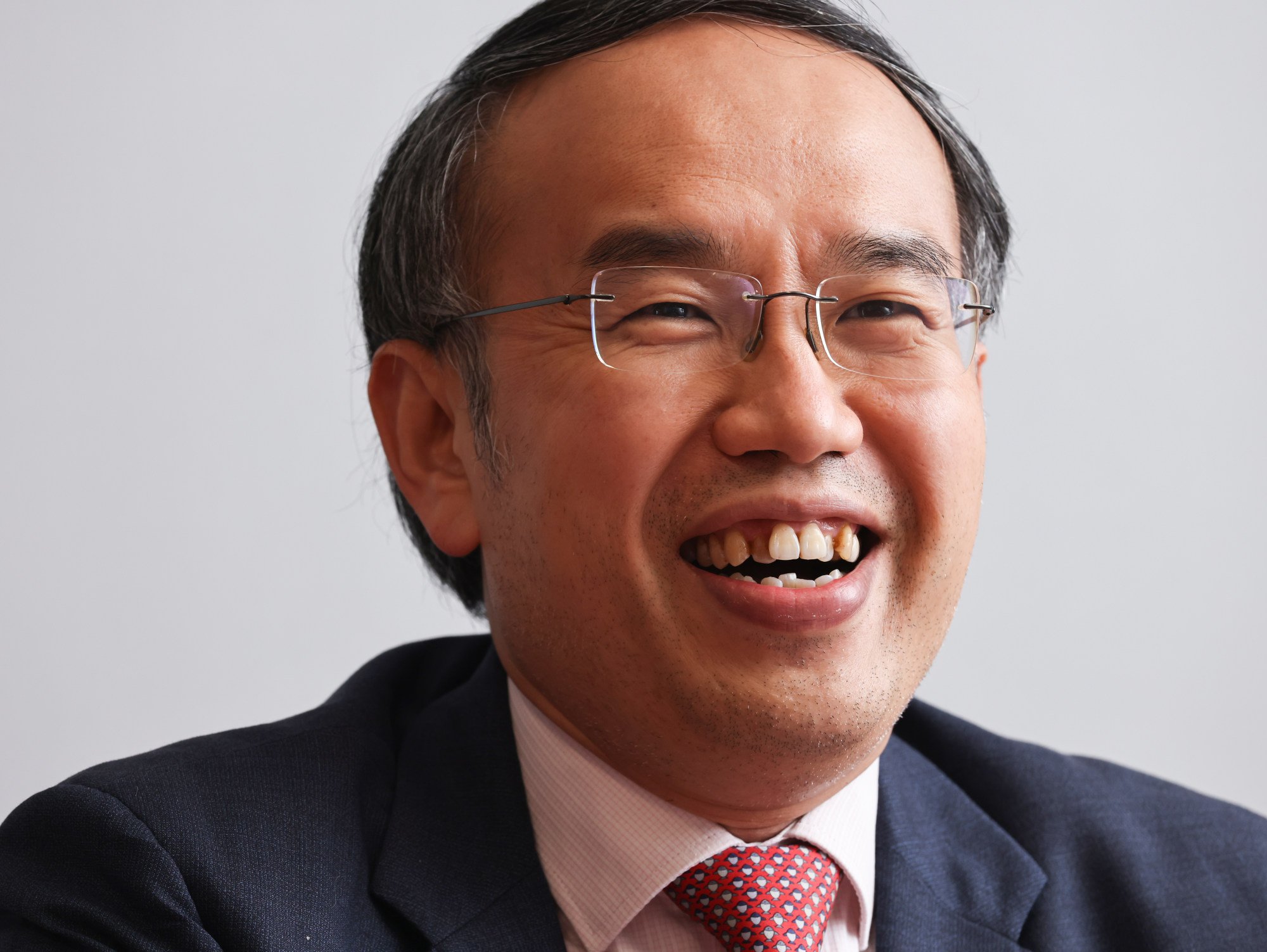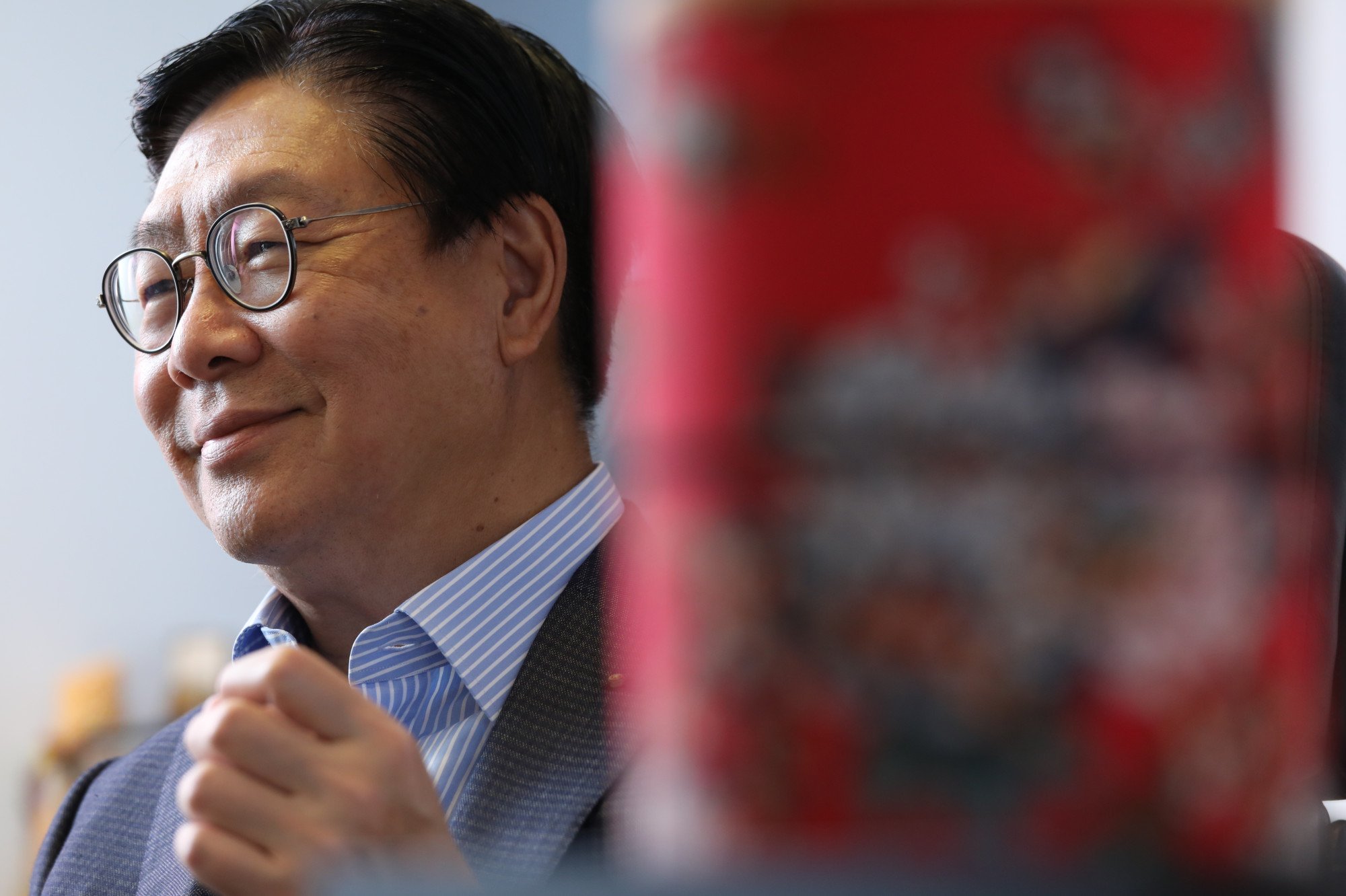
Hong Kong minister hits out at claims that city’s days as global financial hub are over
- Hong Kong’s status was ‘not a tall building or a monument that can be brought down by pressure,’ treasury secretary Christopher Hui says
- Data showing slowdown in IPO market has prompted wave of negative comments on mainland Chinese social media likening Exchange Square to an ancient relic
Hong Kong’s treasury chief has hit back at claims the city’s standing as a leading global financial centre is over, as the government took aim at a wave of negative comments on mainland Chinese social media, including comparisons of the building that houses the bourse to an ancient relic.
Secretary for Financial Services and the Treasury Christopher Hui Ching-yu on Friday became the first minister to respond to the claims, saying Hong Kong’s status was “not a tall building or a monument that can be brought down by pressure”.
“Macroeconomic factors, such as the uncertain global economic outlook, unstable geopolitical conditions and the extended interest rate environment have inevitably restricted Hong Kong’s financial market, especially share trading and the short-term performances of IPOs,” he wrote on his blog.
“But Hong Kong’s financial market has a solid foundation … and is internationalised, comprehensive and growing in nature.”

In the past two months, internet users over the border have slammed the city’s status as a financial hub. They compared Central’s Exchange Square, which houses the city’s bourse, to historical tourist attractions such as the site of the Terracotta Army in Shaanxi.
The attacks came after financial information provider Refinitiv published market data showing proceeds generated from IPOs in Hong Kong had hit a 20-year trough. It ranked the stock market ninth in a global list for the first half of 2023, one spot higher than last year but behind the third place on the 2022 list.
The semi-annual Global Financial Centres Index, produced by think tanks China Development Institute and Z/Yen Partners, put Hong Kong in fourth place this year, with Singapore, London and New York respectively coming third, second and first.
Hong Kong ranks ninth globally for IPOs as fundraising hits 20-year low
Official local figures showed the financial sector accounted for 22.4 per cent of the city’s gross domestic product, up from 21.3 per cent in 2021.
Frederick Ma Si-hang, chairman of insurer FWD Group Holdings, also raised eyebrows at a conference on Tuesday when he referenced the claims that Hong Kong’s status as an international finance hub was a thing of the past.
He later told the Post: “It is not yet dead, and is still alive.”
Ma, who served as treasury minister between 2002 and 2007, also argued the stock market was just one of five pillars holding up the city’s financial market, alongside bonds, asset management, banking and insurance.
Bernard Chan, chairman of the Our Hong Kong Foundation think tank, on Friday argued that the claims from internet users on the mainland should not be taken seriously.
Asia’s first Saudi ETF gains in debut in milestone for China-Middle East ties
But he acknowledged that the local economy was under pressure, since its performance was closely tied to the rest of the country, which is currently experiencing a slowdown.
“Hong Kong needs to diversify into new markets on top of focusing on its economic mainstay, China,” Chan said.
Ceajer Chan Ka-keung, a former treasury minister and now adjunct professor of finance at the Hong Kong University of Science and Technology, said he disagreed that the city had lost its appeal as an international financial hub.
“Hong Kong’s financial market is at a critical point, but it is doing OK,” he said. “The question is how to make long-term fundraising activities sustainable against the backdrop of geopolitics.”

Ma also said Hong Kong’s bourse was not the only one struggling amid current market conditions, pointing to the macroeconomic challenge posed by rising interest rates.
Hong Kong has hosted 61 IPOs so far this year, raising US$5.3 billion. Last year, the city had 90 listings that raised US$13.4 billion.
Ma said Hong Kong had fared better than Singapore over the first 11 months of 2023. The number of IPOs the city state hosted in the same period fell to six, down by half over last year. The listings this year have raised US$34.94 million, down by 92 per cent over the same period last year.
The United States last year hosted 181 IPOs, against 146 so far this year, which raised US$19.3 billion, an increase of 151.9 per cent, he noted.
The industry leader said Hong Kong also enjoyed more robust insurance and bond markets compared with regional rivals.
Hong Kong’s Paul Chan says exports likely to face significant hurdles in 2024
Gross premiums generated by the general insurance sector in Hong Kong stood at US$8 billion in 2022, compared with US$3.6 billion recorded by Singapore, he noted.
“When one pillar is weak, it doesn’t mean [the city’s] international financial centre status has gone,” Ma said. “Nevertheless, Hong Kong cannot afford to be complacent as many markets are eyeing the same pie.”
Ma called on the government to focus on attracting and retaining talent, as well as “perfecting” rules and procedures governing IPOs in the mainland, Middle Eastern and Asean markets.
The Association of Southeast Asian Nations comprises the Philippines, Indonesia, Malaysia, Singapore, Brunei, Thailand, Vietnam, Cambodia, Laos and Myanmar.
HKEX, LME relish ‘incredible opportunities’ after winning nickel lawsuit
Discussing the role of the Hong Kong Exchanges and Clearing, Ma said: “There is a need to strike a balance between vetting IPOs in a timely manner and gatekeeping.”
University scholar Chan said Hong Kong should focus on attracting more IPOs and the bourse should diversify its products.
“Getting more IPOs from the Middle East and Asean is the right direction, but China should remain its core market,” he said.
Chan suggested that the government make public more details about its collaboration with the China Securities Regulatory Commission to help pave the way for more mainland firms to go public in the city.
Additional reporting by Cannix Yau

